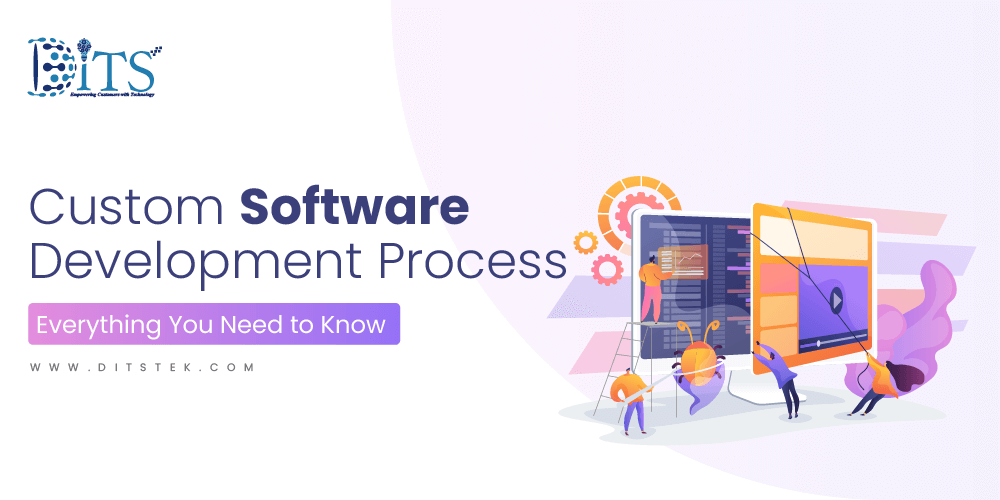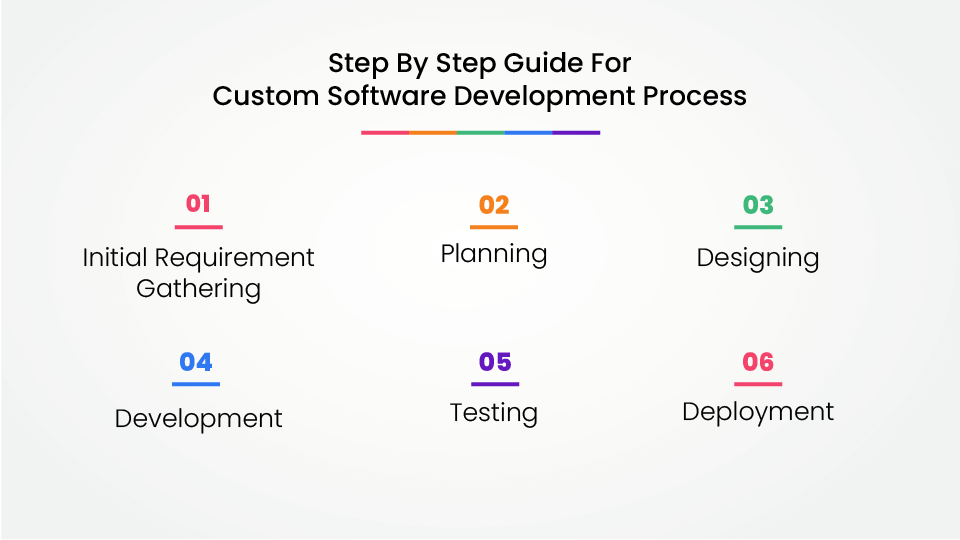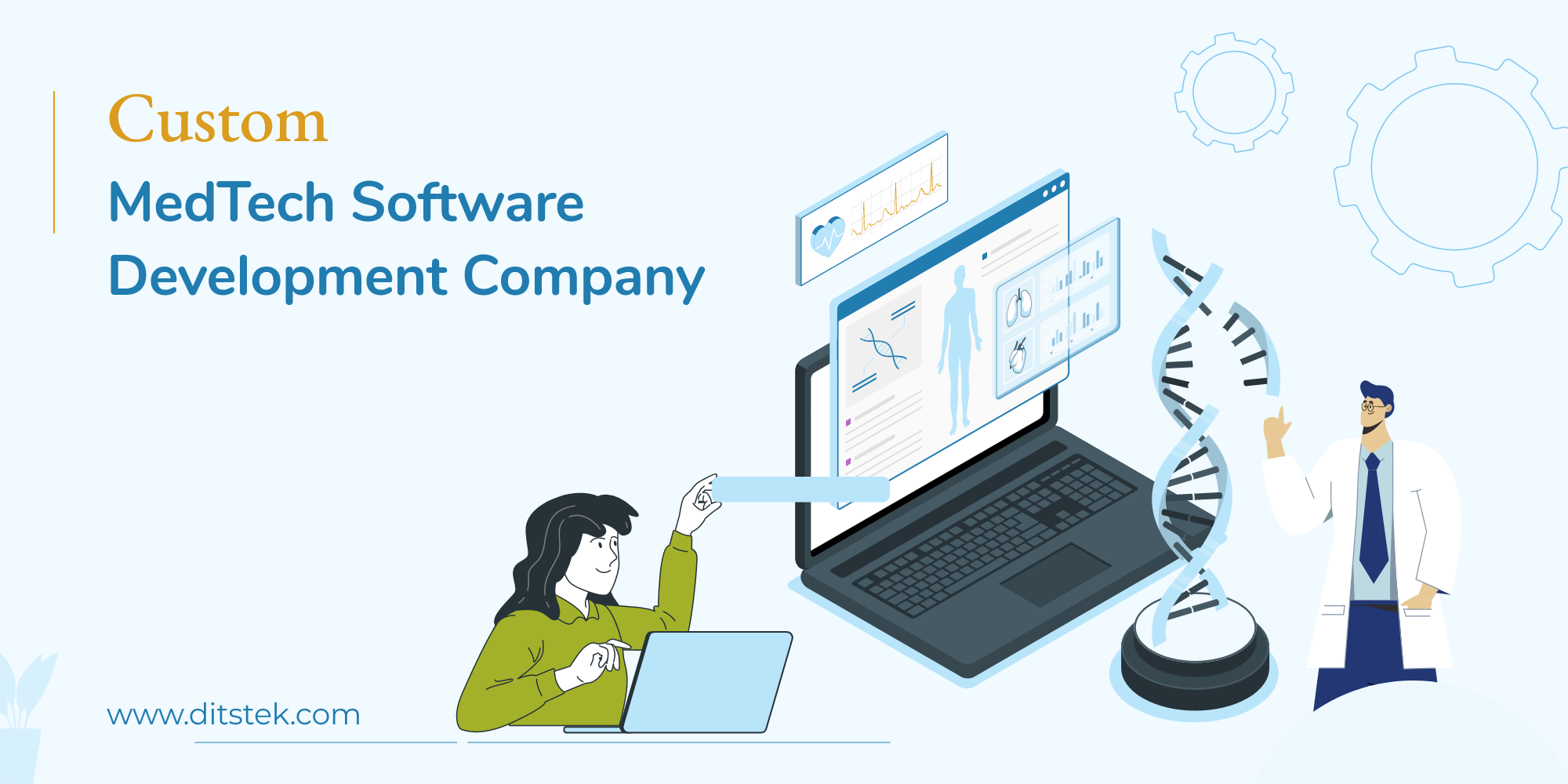Step By Step Guide On Custom Software Development Process
Table Of Content
Published Date :
12 Apr 2024
In the rapidly evolving world of software development, businesses now have the freedom to tailor bespoke applications to their specific needs—a process known as a custom software development process. This approach allows companies to leverage their desired technology stacks, expertise, and methodologies to create unique solutions. To navigate this dynamic landscape, businesses are turning to custom software development companies for assistance.
This blog serves as a comprehensive guide to understanding everything about the custom software development process, from initial requirements gathering to deployment and ongoing maintenance. Thus, if you're exploring custom software solutions, this guide equips you with the knowledge to make informed decisions that align with your business objectives. Without further ado, let’s get started.
What is Custom Software Development?
Custom software development is a process that involves the identification of specific business needs, the creation of tailored technology solutions, and their seamless integration into existing operations. This journey extends beyond initial implementation to ongoing scaling and enhancement of the software, with a focus on generating and increasing ROI. The custom software development process ensures that the software is finely tuned to meet the unique requirements and objectives of each business. Whether it involves developing backend systems or crafting mobile applications, the goal is to optimize efficiency and effectiveness in achieving strategic goals.
According to Statista, the custom software development market is poised to hit USD 179.90 billion by the end of 2024 with an estimated compound annual growth rate (CAGR 2024-2028) of 6.87%, and USD 234.70 billion by 2028.
This surge reflects the growing significance of custom solutions for businesses striving to maintain competitiveness in today's dynamic landscape. Custom applications offer unparalleled flexibility, allowing companies to swiftly adapt to evolving customer demands and technological advancements. By leveraging custom solutions, businesses can optimize their digital infrastructure, unlocking unparalleled efficiency and agility.
Ready To Build Your Custom
Software Solutions?
Get in touch with Ditstek Innovation professionals today & turn your vision into reality.
Why is Custom Software Development Important?
While considering custom software development, you might doubt if it is really worth time and money. But, knowing the benefits of custom software development can help you make an informed decision. Here are some reasons why custom software development is so important nowadays:
Customization
Custom applications provide a significant edge via personalized solutions. Unlike off-the-shelf software designed for a large audience, bespoke or custom solutions are crafted to match your project's exact specifications.
Through the development of software tailored exclusively to your requirements, you can secure a competitive advantage. Partnering with an experienced custom software development team empowers you to tackle your unique challenges and unlock exclusive benefits. A custom solution will incorporate your preferred features and technologies, ensuring that your product distinguishes itself from the competition.
Cost-Effectiveness
While off-the-shelf software might appear cost-effective initially, its long-term value is often overshadowed by recurring expenses and the need for extensive customization to align with your operational needs. Over time, these solutions may reveal gaps in functionality, necessitating the development of new software.
On the other hand, custom software offers a budget-friendly alternative in the long run. A software tailored to your specific needs allows for iterative development to accommodate your budget, such as starting with MVP development to validate your idea before progressing to a fully functional product.
More Security and Reliability
Custom software stands out for its unparalleled reliability, featuring designs that adhere to the top security standards and leverage cutting-edge technologies tailored to your business and industry needs. This is particularly crucial for sectors like healthcare, insurance, and fintech, where stringent security protocols and regulatory compliance are paramount to safeguarding sensitive data.
Crafting bespoke software solutions involves a thorough analysis of your requirements, integrating industry best practices while addressing potential hidden risks and challenges. Continuous testing further improves custom software, enhancing its reliability and ensuring maximum value for your business.
Seamless Integration
In today's business landscape, software tools are indispensable for ensuring seamless operations. Custom-tailored solutions offer a distinct advantage over other alternatives by supporting high levels of integration with third-party tools. Specifically designed to align with a company's existing systems and processes, these bespoke solutions enable real-time visibility into business operations, facilitating efficient data management and analysis.
Improves Productivity
Custom software, tailored to your goals and incorporating all your technological and business needs, enhances team efficiency. This approach typically results in increased productivity, allowing the team to spend less time on mundane tasks, gain deeper insights from data analysis, and seamlessly manage multiple activities simultaneously.
Step By Step Guide For Custom Software Development Process

From DevOps to Waterfall and Agile, there are several software development methodologies including different processes. But, all these approaches share the following basic steps -
- Initial Requirement Gathering
- Planning
- Designing
- Development
- Testing
- Deployment
Let us go through every stage of custom software development process one by one:
Step 1: Initial Requirement Gathering
During the initial requirement-gathering phase, we schedule meetings to delve into the ins and outs of your project. This involves noting your specific goals and objectives, as well as identifying the target users and their expected interactions with the final product. By compiling this information, our software development team assesses the feasibility of accommodating all your project's requirements.
Step 2: Planning
Once all customer requirements have been gathered, they are transformed into a comprehensive plan detailing the optimal approach to meeting those needs. This critical step entails defining the project scope, crafting a detailed project timeline, and outlining the specific requirements for the software application. By planning at this phase, the software provider can identify any potential challenges and build strategies to mitigate misunderstandings or complications as the project progresses.
Step 3: Designing
Once the developer and client reach a consensus on the software's functionality, the next step is to strategize its optimal implementation. This phase involves delving into the design aspect, contemplating system architecture, and refining its external appearance. The design step includes crucial details such as technical architecture, database design, and user stories, laying the foundation for the software's development journey.
Step 4: Development
This phase stands as the cornerstone of the software development process. It includes coding, debugging, and several other activities to align the software with customer requirements and design specifications. While development processes may vary based on the chosen software development model, Agile methodology is increasingly favored by companies due to its flexibility and adaptability.
Step 5: Testing
After development, testing is the next step to find and fix any mistakes or problems in the software. During testing, there are two main types of tests:
Non-functional testing looks at parts of the software like reliability, usability, security, and performance. This is to make sure the software works well in different situations.
Functional testing checks if each function of the software works as it should. If a problem is found, it's fixed and then retested. This process continues until the software meets the quality standards. Both the software provider and the customer team are responsible for testing the software.
Step 6: Deployment
The next phase in the custom software development process is deployment, often regarded as the ultimate stage, as it brings the software to end-users either online or through installation on their devices.
Moreover, customers must decide on the deployment type—on-premise or cloud-based. On-premise deployment entails hosting the software on the company's servers, while cloud-based deployment involves utilizing virtual computing resources like Azure or Google Cloud.
Ready to Elevate Your Business
With Cutting-edge Software?
Send us your requirements on info@ditstek.com or Call us at: +91-623-942-1395
What Factors to Consider While Building Custom Software?
Building custom software involves several essential considerations to ensure its success and effectiveness. These factors play a crucial role in determining how well the software performs, how easy it is to use, and how sustainable it is.
1. Build vs. Buy
- Problem uniqueness: Determine if your business problem is unique or common and if there are existing off-the-shelf solutions.
- Total Cost of Ownership (TOC): Compare the long-term costs of building custom software versus buying and customizing off-the-shelf solutions.
- API integrations: Check if existing off-the-shelf solutions offer the necessary API integrations for seamless operation with your systems.
- Competitive advantage: Assess if custom software will give you a competitive edge or if off-the-shelf solutions are enough.
- Scalability: See if available off-the-shelf solutions can grow with your business.
- Feature requirements: Ensure that off-the-shelf solutions offer the features you need.
2. In-House Development vs. Outsourcing
- In-house development is suitable for companies with skilled internal teams.
- Outsourcing software development is cost-effective for businesses needing domain expertise, access to the latest technology, and market knowledge.
3. Software Development Methodology
- Evaluate methodologies like Waterfall, Agile, Feature-Driven Development (FDD), and Lean, considering their pros and cons.
- Agile methodology is popular for its incremental and iterative approach.
4. User Experience (UX)
Prioritize intuitive design, user-friendliness, and usability. Follow the best UI/UX design practices for an engaging user experience.
Why Outsource Custom Software Development Projects?

Some of the top advantages of outsourcing software development projects to an offshore team are -
Access to Advanced Technology
Expert software outsourcing companies tackle challenging projects by providing cutting-edge technology solutions to clients of all sizes and industries. Businesses no longer need to invest heavily in infrastructure or train new employees on the latest technology. Instead, custom software development companies offer a dedicated team with expertise in technology to develop seamless software solutions.
Access to Specialized Talent
By outsourcing projects to software development providers, businesses gain access to skilled professionals experienced in enterprise application development. This reduces recruitment costs and frees up time for businesses to focus on their core operations while leaving their digital transformation in capable hands.
Industry Expertise
Software development companies work across various industries like healthcare, education, finance, and banking. This exposure equips custom software developers with diverse technology stacks and best practices to deliver high-quality technical solutions tailored to specific industry needs.
Focus on Core Competencies
Custom software development outsourcing allows businesses to concentrate on their core strengths without the risk of losses from experimenting with unfamiliar technology.
Cost Savings
Custom software development companies offer flexible resources that can be scaled up or down based on project requirements, allowing businesses to pay only for the developers engaged during the payment period.
Global Perspective
With extensive experience serving diverse industries and regions, software development companies bring global standards and expertise to customized software solutions.
Why Work With Ditstek Innovations for Custom Software Development?
At Ditstek Innovations, we specialize in crafting custom software solutions tailored to various industries, leveraging cutting-edge technologies like AI, and IoT. With our team of seasoned professionals, we bring expertise and experience to every project, having successfully delivered numerous solutions across diverse sectors. Our track record of excellence demonstrates our ability to tackle complex challenges and deliver innovative solutions aligned with our client’s unique needs.
We prioritize agile development, ensuring flexibility and continuous improvement throughout the software development lifecycle. Our comprehensive documentation provides clarity and continuity, covering every aspect of the project from requirement specifications to user manuals. We conduct extensive testing at every stage to guarantee code quality, reliability, and security while maintaining code coherence through consistent coding styles enforced by advanced tools.
Accurate time and budget estimation, thorough code reviews, and ongoing maintenance and support are integral parts of our commitment to delivering successful software solutions. With DITS, you can trust that your project is in capable hands, allowing you to focus on your core business activities while we handle the maintenance and optimization of your software, ensuring its long-term success.
Have a custom software idea in mind? Let’s connect! Share your vision at info@ditstek.com

Dinesh Thakur
21+ years of IT software development experience in different domains like Business Automation, Healthcare, Retail, Workflow automation, Transportation and logistics, Compliance, Risk Mitigation, POS, etc. Hands-on experience in dealing with overseas clients and providing them with an apt solution to their business needs.
Recent Posts

To digitally transform healthcare businesses, innovate products, or build a digital platform, you need a different partner. DITS is your trusted partner in custom medtech software development.

Discover how AI transforms automotive manufacturing, supply chains, safety, and sales, driving measurable efficiency, resilience, and competitive growth in 2026 and beyond.

Use AI for claims processing to cut errors, speed up approvals, and boost accuracy. Transform insurance workflows with smart automation and better efficiency.